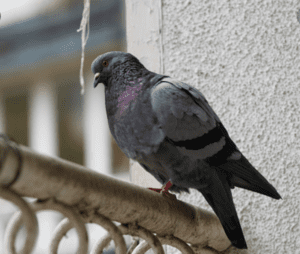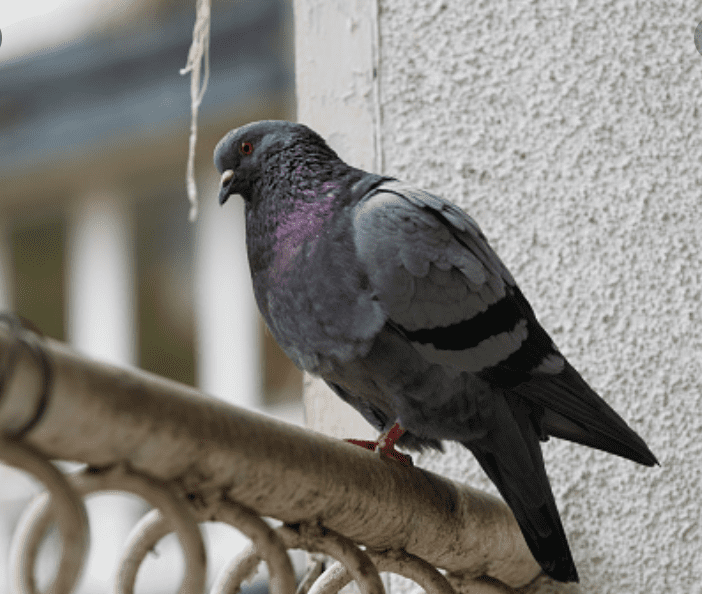Some people enjoy spending time around pigeons in parks or sidewalks and feeding them seeds or bread crumbs, while others see pigeons as pests that harbor dangerous diseases. No matter whether you love pigeons or hate them, they do spread diseases that can infect humans. Psittacosis is one of these diseases. Occasionally being around pigeons is unlikely to lead to infection. But certain circumstances surrounding homes and businesses can put people at risk of becoming infected. So it’s important to learn about the symptoms and how pigeons spread psittacosis.

What Is Psittacosis?
Psittacosis is a respiratory illness that humans obtain from a type of bacteria (Chlamydia psittaci ) shed by birds. Sometimes called parrot fever or ornithosis, the disease can affect many different species of birds. Infected birds can become very sick or show no symptoms at all, making it difficult to know if surrounding people are at risk. Whether birds have symptoms or not, they can still pass the disease to people and other mammals.
Infected birds with and without symptoms shed the bacteria in respiratory secretions and droppings. When these secretions and droppings dry, they form dust that spreads through the air and can be inhaled into human respiratory systems. People get the disease by breathing in dried dust particles — that’s how pigeons spread psittacosis. However, it can be spread through bites or beak-to-mouth contact.
People of any age can contract psittacosis, but it’s most common among bird owners or people who work in bird-related occupations. However, psittacosis in pigeons can present additional points of infection. The illness has a rapid transmission rate among birds and thrives in overcrowded areas, like roosting spaces and nests. So it’s likely that massive flock outbreaks occur among pigeons.
Psittacosis Symptoms
Most often, psittacosis symptoms are similar to flu symptoms. However, symptoms can become severe and include pneumonia. If you suspect you’ve been infected with psittacosis, it’s necessary to seek medical attention since antibiotic treatment is required. Symptoms may include:
- • Dry cough
- • Fever
- • Chills
- • Headache
- • Muscle aches
- • Nausea/vomiting
- • Sore throat
- • Difficulty breathing in severe cases
- • Chest pain in severe cases
- • Pneumonia in severe cases
- • Nosebleeds in severe cases
- • Swelling of organs in severe cases
Treatment
Psittacosis is considered rare in humans since only 50 to 200 cases each year are reported. However, many researchers think the illness is under-reported; the symptoms mimic common illnesses like the flu, and the point of infection often goes unnoticed. Severe cases of psittacosis require medical treatment for recovery. Antibiotic therapy is the primary treatment for individuals with psittacosis (typically tetracycline or doxycycline).
How Pigeons Spread Psittacosis
While people also call psittacosis ‘parrot disease,’ any bird susceptible to the bacteria can spread infection. Since pigeons travel and roost in large flocks, it’s likely that the disease spreads readily among pigeons in crowded areas. Sick birds can exhibit symptoms like red, watery eyes, nasal discharge, lethargy, ruffled feathers, diarrhea, and a poor appetite. Alternatively, they can exhibit no symptoms at all. It’s suspected that pigeons have genetic resistance that makes them more likely to show no symptoms and, consequently, become carriers.
In many cities, workspaces, and areas around homes, pigeons roost in large groups and leave piles of feces that must be cleaned away regularly. These areas create potential infection points for people. Once you know how pigeons spread psittacosis, you can focus on maintenance tasks that minimize the risks.
Psittacosis Dangers for Homeowners
Pigeons are common in both urban and rural areas. Unfortunately, when they decide to infest the space around your home, you might find them roosting over your patio, on your children’s play equipment, or even in your attic. If you have pigeons roosting around your home, they leave piles of droppings anywhere they flock. After what you’ve learned about how pigeons spread psittacosis, imagine sweeping piles of dried droppings from your patio — or worse, your attic. When pigeons spend their nights or evenings on playhouses or swing sets, they put your children at risk of getting psittacosis when they go outside to play.
Short of avoiding the spaces you enjoy outdoors, it’s nearly impossible to completely eliminate the risk of psittacoses exposure when you have a pigeon infestation. The solution is deterrence. Visual bird deterrents include lights, holographic devices, and decoy owls or other decoy predators that can be used to frighten pigeons away from your home and yard. Audio bird deterrents work best for residences without pets. They use distress calls and frightening noise to scare birds away.
Psittacosis in Commercial Settings
Commercial properties are even more likely than homes to attract flocking pigeons. If you’ve dealt with pigeons at your business property, you know all the spaces where they leave piles of droppings (and the damage they can cause). As a business owner, you know bird droppings and the health risks of psittacosis present a variety of worries. Droppings on storefronts, trash cans, streetlights, sidewalks, parking lots, railings, and any of the other places pigeons roost have the potential to endanger your customers and employees, as well as your own health. Even worse, when pigeons get inside your commercial building, they can pose additional threats by accessing your storage.
As a business owner, you have a responsibility to keep your landscape and business clean. But cleaning away bird droppings can present risks. OSHA recommends precautions to protect workers from contracting the disease through inhalation. However, deterrence can help you avoid all the problems associated with pigeons and their effect on commercial spaces. While visual and audio deterrents are useful in commercial settings, other measures might also be required. Bird spikes and optical gel are both popular solutions for deterring pigeons in commercial spaces.
Learning about how pigeons spread psittacosis and the dangers caused by pigeon droppings can help you understand the disease’s symptoms and ways you can avoid infection. Safely and humanely deterring pigeon flocks is the best way to avoid dangers from their droppings and the damage they cause around your home or business. To learn more about psittacosis and other diseases that can be spread in pigeon droppings, get in touch with our bird control experts.
Pigeon Patrol Products & Services is the leading manufacturer and distributor or bird deterrent (control) products in Canada. Pigeon Patrol products have solved pest bird problems in industrial, commercial, and residential settings since 2000, by using safe and humane bird
deterrents with only bird and animal friendly solutions. At Pigeon Patrol, we manufacture and offer a variety of bird deterrents, ranging from Ultra-flex Bird Spikes with UV protection, Bird Netting, 4-S Bird Gel and the best Ultrasonic and audible sound devices on the market today.
Voted Best Canadian wholesaler for Bird Deterrent products ten years in a row.
Contact us at 1 877-4-NO-BIRD,(604) 585-9279 or visit our website at www.pigeonpatrol.ca
Pigeon/Pigeon Patrol / Pigeons Roosing / Vancouver Pigeon Control / Bird Spikes / Bird Control / Bird Deterrent / PIgeon Deterrent / Surrey Pigeon Control / Pest / Seagull deterrent / Vancouver Pigeon Blog / Birds Inside Home / Pigeons in the cities / Ice Pigeons / What to do about pigeons / sparrows, Damage by Sparrows, How to Keep Raccoons Away, Why Are Raccoons Considered Pests / De-fence / Pigeon Nesting / Bird Droppings / Pigeon Dropping / woodpecker control / Professional Bird Control Company / Keep The Birds Away / Birds/rats/seagull/pigeon/woodpecker/dove/sparrow/pidgeon control/pidgeon problem/pidgeon control/flying rats/pigeon problems/ bird netting/bird gel/bird spray/bird nails/bird guard

